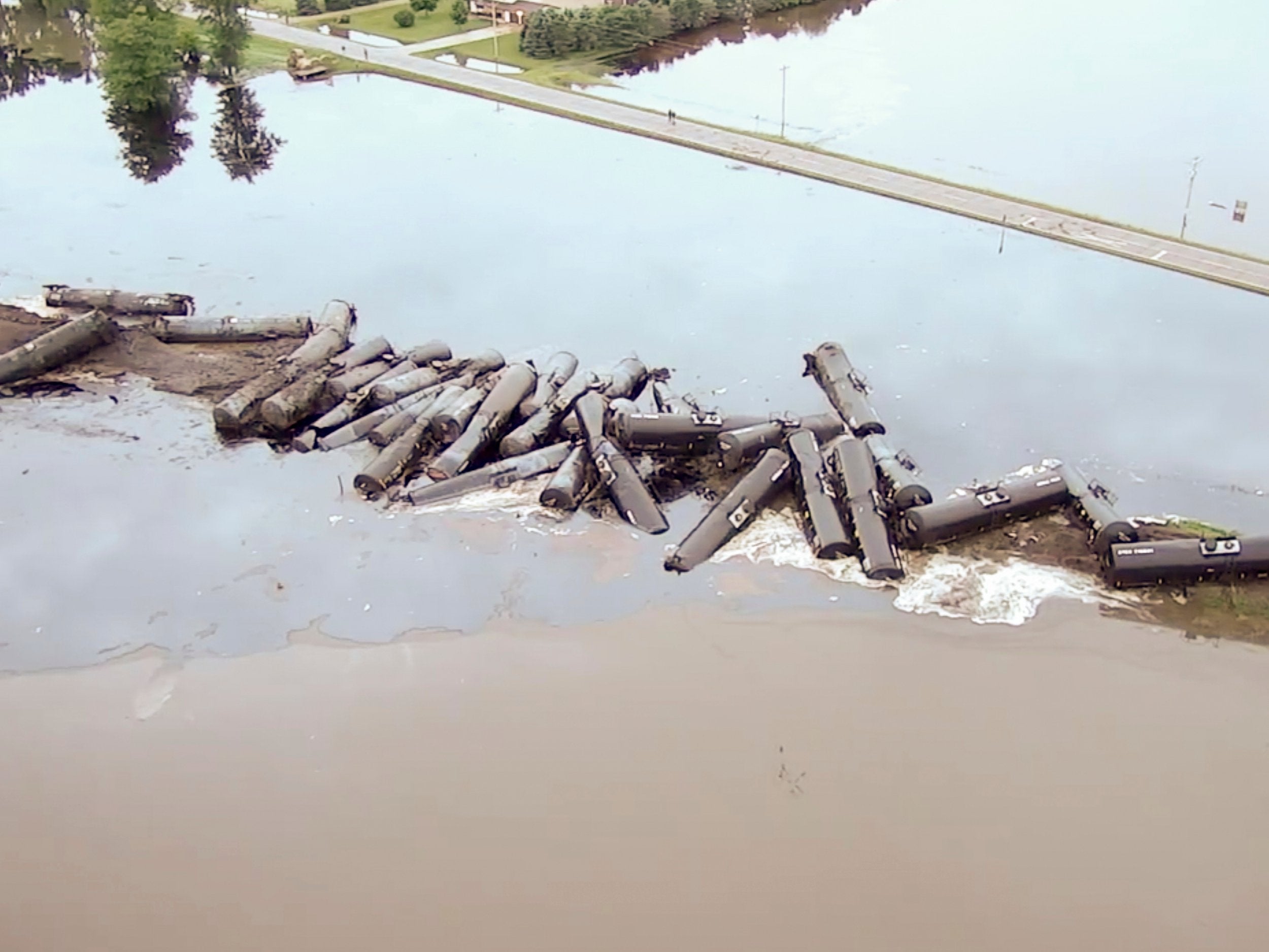Crude oil pours into river after train derails in US
Fears water supplies could be contaminated after crash in flooded Iowa
A freight train that derailed in Iowa is leaking crude oil into a river, raising concerns that water supplies downstream could be contaminated.
Thirty-three tanker rail cars were torn from the track as the train passed through a flooded north-west part of the state early on Friday morning.
Some of the tankers were damaged, causing them to gush oil into flooded fields and the rain-swollen Rock River.
No one was hurt but four homes close to the crash site near the city of Doon were evacuated.
Hazardous materials and environmental experts have been sent in to oversee an urgent clean-up. More than 30 lorries carrying cleaning equipment had arrived at the scene by Friday afternoon.
“We are containing the oil that was spilled as close to the incident as possible using containment booms and recovering it with skimmers and vacuum trucks,” said BNSF Railway spokesman Andy Williams.
Officials said flooding probably caused the derailment, at 4.30am (10.30am BST), but it was unclear how. The water may have compromised the track or pushed the cars off the rails.

The river rose rapidly after five to seven inches (13 to 18cm) of rain fell Wednesday and a further downpour on Thursday.
A broadening sheen of oil spread near several of the stricken tankers, which piled up across the track following the derailment. Some were submerged in the water.
Lyon County Sheriff steward Vander Stoep said drinking water in Doon and the immediate surrounding area did not seem to be at risk.
However, several towns that draw water from shallow wells near the Rock River have been alerted about possible contamination.
News of the spill prompted authorities in Rock Valley, a small city about five miles (8km) south-west of the crash site, to shut off all the city’s drinking water wells.
Water towers will also be drained as a precaution, said Rock Valley public information officer Travis Olson.
In the meantime the city will source supplies from the nearby Rock Valley Rural Water system, which is not in danger of being contaminated by the spill.
Rock Valley, with a population of nearly 3,400, will stay on the rural water system until testing by the Iowa Department of Natural Resources confirms the safety of the city’s drinking water, Mr Olson said.
“I don’t know how long that will be,” he added. “It sounds like the clean-up is going to take a while.”
Mr Williams said he was unsure how much oil had leaked and how many of the cars were compromised.
Mr Stoep said oil was being carried downstream into the Rock River a few hundred yards west of the derailment.
No information was immediately available on how much oil each of the tankers was carrying.
The Rock River, which joins the Big Sioux River before merging into the Missouri River at Sioux City, had already carried some oil to Rock Valley by mid-morning.
The Iowa Natural Resources Department was trying to determine how face the oil was flowing south but the difficulty of their task was compounded by spreading floodwater, said supervisor Ken Hessenius.
“The river, instead of being 100 yards wide, is now maybe a half-mile wide [in parts],” he added.
Doon is about 40 miles (65km) southeast of Sioux Falls, South Dakota, where several rain-swollen rivers overflowed Thursday.
The National Weather Service has forecast flooding in the area over the weekend.
Additional reporting by AP
Join our commenting forum
Join thought-provoking conversations, follow other Independent readers and see their replies
Comments
Bookmark popover
Removed from bookmarks